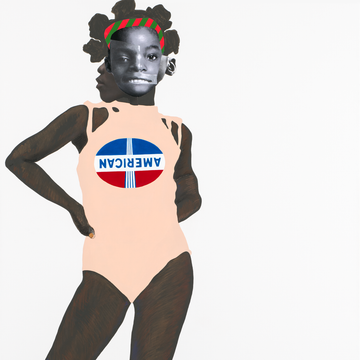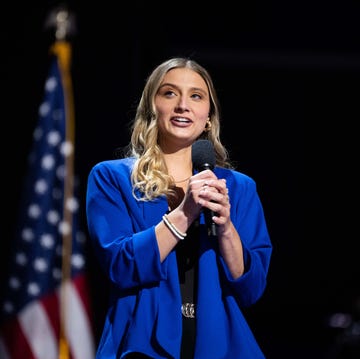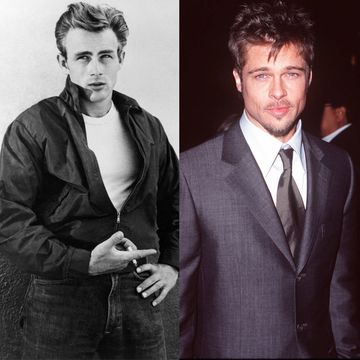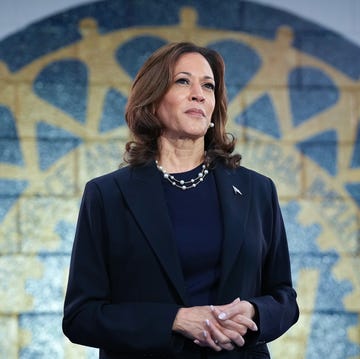Republican presidential nominee Donald Trump’s closing rally on Sunday in New York City doubled down on the campaign’s hypernationalism and xenophobic rhetoric. “America is for Americans and Americans only,” declared longtime advisor Stephen Miller, while Trump promised to “launch the largest deportation program in American history” on his first day if elected to a second term. But it was one of the event’s opening acts, a stand-up comic brazen in his use of explicitly racist jokes, who struck the rawest nerve in a country long plagued by the problem of white nationalism and recurring flirtations with fascism.
Many have equated Trump’s rally at Madison Square Garden with the 1939 Nazi event that took place in the same venue. A marked difference was the carnivalesque tone of the Trump event, which was filled with MAGA celebrities from Hulk Hogan and Dr. Phil to right-wing comedy podcasters, all invited to balance out the more serious, explicitly fascist messages on the agenda.
Comedian Tony Hinchcliffe, a cultural surrogate known for shock comedy squarely in line with Trump’s rhetoric, was invited to deliver the kind of racist humor Trump cannot currently express himself in this tight-looking presidential race. Under the guise of free speech and mantle of “equal opportunity offender,” Hinchcliffe performed a noxious routine targeting various racialized communities. He mocked Latino migrants and birth rates, joked about Black people carving watermelons instead of pumpkins for Halloween, ridiculed Palestinians and Jews—jokes that have since gone viral. “Republicans are the party with the good sense of humor,” he quipped.
Hinchcliffe’s racist joke about Puerto Rico, in which he simply derided it as a “floating island of garbage,” gained the most traction and may cost Trump a significant number of votes in battleground states. The Trump team publicly distanced itself from Hinchcliffe’s vile performance following public outcry on social media. “I have no idea who he is,” Trump told Fox News host Sean Hannity two days after the event. “Somebody said there was a comedian that jokes about Puerto Rico or something…. Never saw him, never heard of him, and don’t want to hear of him.” But Hinchcliffe was riffing on Trump’s own history of making racist comments often couched as humorous remarks.
Divisive humor has played a central role in Trump’s rise to power. Over the last eight years, Trump has posed as insult-comic-in-chief in interviews, at rallies, and during stump speeches, all in the service of consolidating a base around an ideology rooted in social division, mockery, and dehumanization. Trump weaponizes humor and deploys it with intent. It operates as a lighthearted channel for the discriminatory and racist policies he seeks to enact. Ridiculing opponents, he aims to persuade voters and take state power.
Trump’s primary appeal stems from his ability to build solidarity among people who feel left behind by the ravages of global capitalism and the nation’s changing demographics, enraged at losing access to resources and opportunities to which they feel singularly entitled. This includes the inability to freely enjoy the kinds of everyday racist and offensive jokes that once helped soothe the pains of white nation-building, now off limits due to “political correctness,” “DEI training,” “cancel culture,” and “wokeness.” Such terms are mobilized by conservative leaders to galvanize public support among white voters to repeal the social, political, and cultural changes brought about since the Civil Rights period.
Racist humor has long been a powerful vehicle for the normalization of white supremacy, as the legacy of blackface minstrelsy attests. Civil Rights activists struggled for decades to eradicate it from public life, but racist humor has remained prevalent as a private forbidden pleasure, and has entered mainstream public life once again.
As a result, a form of dehumanizing humor that was once as American as apple pie, then rejected, has today emerged as one of the primary vehicles for Trump’s brand of populist politicking. Racialized communities and women of color are central targets at his rallies. This includes women of color in his own party. He misogynistically disparaged opponent Nikki Haley, whose parents moved to the United States from India, as a “birdbrain, highly overrated,” at an event in Sioux City, Iowa, in 2023, and dubbed her “Nimbra” to mock her ethnic identity in the Republican primaries. His signature use of nicknames is intended to humiliate and deflate political opponents, and amuse and unite his supporters. Collective ridicule can be a powerful drug.
Since July of this year, Trump has taken up a clearer posture as a politician-cum-comic. He marshals the pleasure of jokes to do the dirty work of dehumanizing people and groups he sees as a threat to the fascist world order he is trying so hard to create.
“Joe Biden became mentally impaired. Sad. But lyin’ Ka-MAH-la Harris,” he joked at a rally in Pennsylvania in September, “honestly, I believe she was born that way.” Laughter erupts in the wake of his unusually dry delivery of the punch line. At another Pennsylvania rally, and several more in late 2024, Harris’s own laughter was transformed into an object of ridicule and rationale for her disqualification for the highest office. “Have you heard her laugh?” Trump jokes. After a beat, he snarls, “That is the laugh of a crazy person!” The joy of the other can be a real pain.
While he may be “Teflon Don,” skirting felony convictions and evading jail time, there are lines Trump cannot publicly cross, including in the form of jokes, with the political stakes as high as they are in this election. But Hinchcliffe’s comic relief may prove consequential in an election where Trump has tried to increase support from nonwhite voters, though white voters remain the core of his base. Trumpism uses the veneer of a multiracial coalition to deny the MAGA camp’s racism problem. This is similar to the way it makes use of humor and comedians to downplay its fascism problem. In both cases, “it’s just a joke.”
What Trumpian humor and rhetoric have unleashed will not disappear under a Harris presidency, as the supposedly “post-racial” Obama era made clear. Taking pleasure in humor that divides is not only mainstream again, it has also emerged as a political cudgel. One that is likely to inspire future Trump wannabes to weaponize humor in the political arena: to make use of fascist joy to mask fascist power.













